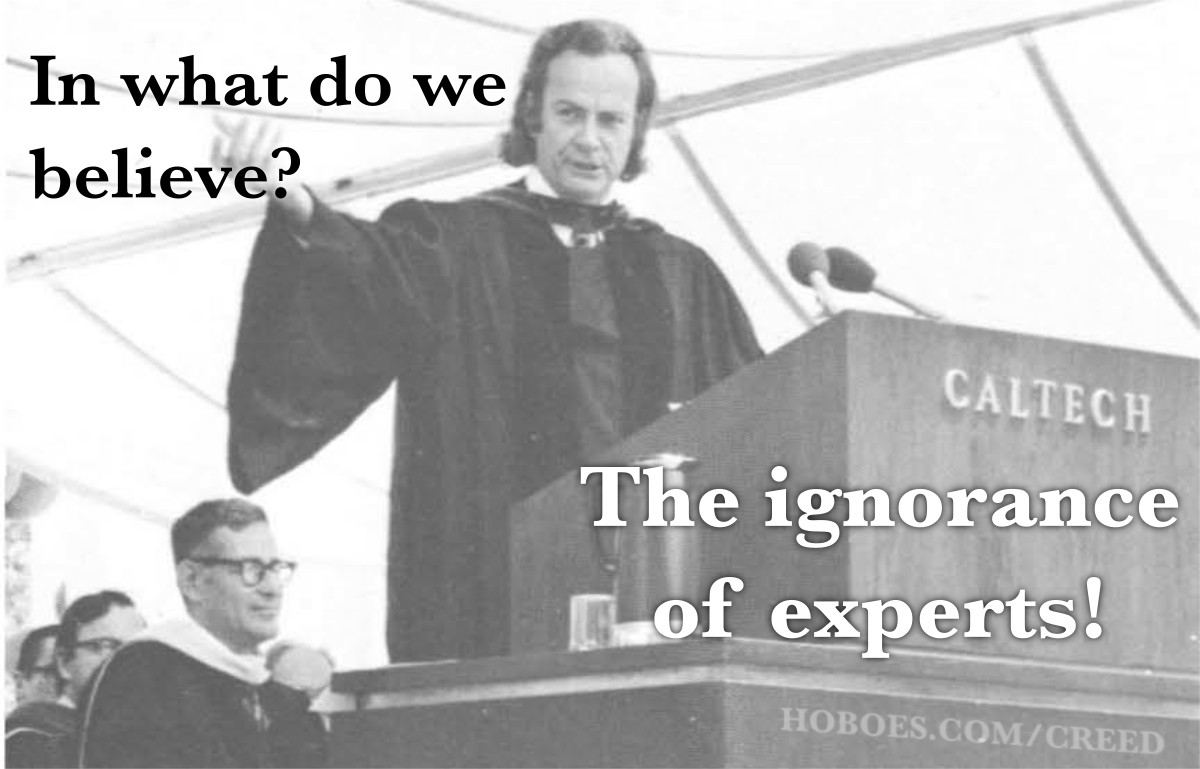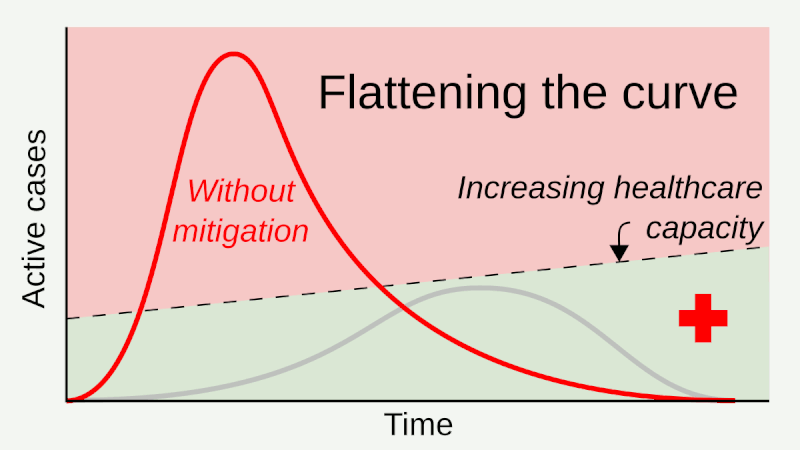Two weeks, and the madness of experts

There’s an old saying about people who say one thing, and act like they believe the opposite. They obviously don’t believe their own words. They might be lying, but they might also merely believe that only other people ought to follow the rules they make.
They might even believe that everyone, including themselves, should follow the rules—but only in the abstract. Everyone else is always abstract, but they easily come up with specific reasons why they, themselves, should be exempt in this particular case. They have Reasons for not following their own rules, while not recognizing that everyone else will also have Reasons.
This blindness is not uncommon among people in general; the problem with government administrators and government experts is that they actually get to make rules that only other people have to follow. Government “experts” are still trying to bring back the 55 mph speed limit, and repeal the 85th percentile rule1, despite all of the hard evidence about how many lives were lost the last time we tried that. Of course, when they’re on the road, they’ll have good Reasons for exceeding those limits, just like they did the last time around.
All of the media talking heads and politicians who say that masks help, act like they believe the opposite. If they took masks seriously, they wouldn’t take their masks off as soon as they thought the camera was off. They wouldn’t require people to wear the same old contaminated mask they’ve been wearing all day—or all week or all month. They’d require a new mask for every establishment and every event, and require new masks at regular intervals during each event.
They’d also require new masks whenever someone touches their mask.
That’s what people who take masks seriously do. If you know any surgeons, ask them how often they use the mask from one surgery during a different surgery. Ask them how they dispose of their masks. They never re-use them. Disposal is a serious business. Ideally, they’re changing masks every two hours or less. And they don’t take the mask out to their car, take it off with their bare hands, and lay it aside on the seat next to the groceries until their next surgery.
Last month we passed one year since the beginning of “two weeks to flatten the curve”. The curve was flattened. Hospitals were readied. Yet the two weeks never ended—in some cases, those ready hospitals had to shut down or fire employees while people outside were dying from lack of care. The experts decided that the process was the goal, and that our health—COVID-related and not—was secondary to the shutdowns and new regulatory powers.
At its heart, conservatism, like science, is a belief in the fallibility of experts. That the wisdom of millions of individuals acting in their own self-interest exceeds the wisdom and probity of experts trying to discern someone else’s best interests.
The left requires Jefferson’s magical angels of genius2, who both know the best interests of others and who will not pretend that their own desires are the best interests of others.
Sometimes it is said that man cannot be trusted with the government of himself. Can he, then, be trusted with the government of others? Or have we found angels in the forms of kings to govern him? Let history answer this question. — Thomas Jefferson (1st Inaugural, 1801)
Conservatives require merely that people know what they want, and be willing to pay for it with their own time and effort.
Relying on genius gave us the unending two weeks, and all the deaths resulting from it. All the suicides and the canceled cancer tests and the forcibly abandoned elderly. All the deaths from forcibly housing the sick with the vulnerable.
We overturned the constitution to improve our health care, and then discovered that overturning the constitution became more important than health. There’s nothing new about this. Benjamin Franklin warned about it over two hundred years ago. Today, he might say that those who would give up their essential liberties to purchase a little health care, both lose their liberty and will inevitably die anyway.

Overthrowing the Constitution for a little health care because we can’t see what use its restrictions are is a lot like tearing down Chesterton’s fence.
There exists in such a case a certain institution or law; let us say, for the sake of simplicity, a fence or gate erected across a road. The more modern type of reformer goes gaily up to it and says, “I don’t see the use of this; let us clear it away.” To which the more intelligent type of reformer will do well to answer: “If you don’t see the use of it, I certainly won’t let you clear it away. Go away and think. Then, when you can come back and tell me that you do see the use of it, I may allow you to destroy it.” — G.K. Chesterton (The Thing)
That fence is there for a reason.3
The trick is discerning which past decisions were made in a conservative way—by the people themselves—and which were thrust upon them by experts who were neither geniuses nor angels. It may be that the fence is purely utilitarian, to bar certain traffic dangerous to the community. It may provide a less obvious but still laudable purpose, such as providing a place for neighbors to congregate.
Or it may have been that the fence was put there to keep government geniuses from deadly overreach. Our Constitution is very much that kind of fence.
People’s self-interest is most wise when government is involved as little as possible. It turns out that it is not just reasonable, but wise, to want an occasional drink. But under prohibition, the wisdom of crowds becomes Al Capone and Chicago violence, and bathtub gin.

It’s when we ignore the constitution and conservative philosophy in favor of experts that we get our worst excesses. It was progressive government under Woodrow Wilson that segregated the federal government. It was progressive experts who used the power of government to force businesses to fire less skilled workers, who the experts ironically called “unemployable”. They weren’t unemployable. They had jobs, and the progressives wanted to weed them out of the workforce.
Much of our evil past that the left accuses conservatives of wanting to return to was the result of small groups of experts using government to enforce their will upon everyone else. Absent Jim Crow laws, there would have been no Jim Crow, wiped out by individual merchants and service providers perfectly willing to satisfy their own selfish self-interest by accepting money from blacks just as from whites. The experts required Jim Crow laws because money has no color but green. Like employers hiring people the experts designated unemployable, businesses were providing services to people the experts thought should be excluded.
The fallibility of experts is the same as the fallibility of everyone else: a tendency to believe that what they want is what everyone else should want. But the fallibility of expert administrators goes further; a tendency to elevate the process over the goal. Slow the spread quickly disappeared as the goal, to be replaced by anything that would keep the process—the shutdown—alive and keep the masks on regardless of whether they provided any functional purpose.
The scientific method is designed to overcome the fallibility of people.4 The Constitution, and conservative philosophy, is designed to overcome the fallibility of politicians and bureaucrats.
In response to The Bureaucracy Event Horizon: Government bureaucracy is the ultimate broken window.
The 85th percentile rule is that speed limits should be set no lower than the speed at which at least 85% of the traffic naturally drives. Lower speed limits than the 85th percentile mean more accidents.
↑Literally, the origin of “genius” is that of a guardian spirit that watches over us from birth to death.
↑“There are reformers who get over this difficulty by assuming that all their fathers were fools; but if that be so, we can only say that folly appears to be a hereditary disease.”
↑To paraphrase Steve Gerber, believe it or not, scientists are people.
↑
- Causes: John Smith at According To Hoyt
- “Item: vaccines. Canada doesn’t have any. We are not making them here, and there are no plans to make them here. Really. Meanwhile, you can’t turn on a TV or a radio (or drive down the road, there’s electronic signs) without having a GET VACCINATED!!!!!!!11!!!! message screamed at you.”
- COVID Lessons: The Health Care Shutdown
- It’s fortunate that COVID-19 was not as bad as the experts said, because our response was almost entirely to make the problem worse. We shut down everything that could help, including health care for co-morbidities. We locked the healthy and the sick together, and cut people off from routine care. Most of the deaths “from” COVID-19 were probably due more to our response than to the virus itself.
- Obedience Fatigue: Mark Pulliam at Law & Liberty
- “Dr. Anthony Fauci… began the flip-flopping in early 2020, when he mandated the wearing of masks, after previously opining on the news show 60 Minutes that ‘There’s no reason to be walking around with a mask.’ In fact, Fauci went even further, suggesting that mask-wearing could be counter-productive for the general public. Fauci’s early advice was consistent with the then-prevailing ‘scientific consensus,’ as reflected by the World Health Organization (WHO) and Centers for Disease Control and Prevention (CDC), both of which recommended mask-wearing for healthy people only when taking care of those who are sick or suspected of having the virus.”
- A Powerful Case By Law Enforcement For Safe And Realistic Speed Limits at National Motorists blog
- “As shown in Figure 2, Speed Studies, the 85th percentile speed actually decreased from 73 mph to 72 mph when the posted limit was 15 mph higher.”
- Slavery is barbarism
- Of course progressives believe slavery is a net economic positive. When the left talks rights, they’re talking about the power of government to force people to both provide something and to deny it.
- Why ‘flattening the curve’ may be the world’s best bet to slow the coronavirus: Helen Branswell
- “The United States and other countries, experts say, are likely to be hit by tsunamis of Covid-19 cases in the coming weeks without aggressive public health responses. But by taking certain steps—canceling large public gatherings, for instance, and encouraging some people to restrict their contact with others—governments have a shot at stamping out new chains of transmission, while also trying to mitigate the damage of the spread that isn’t under control.”
More mob science
- How to overcome vaccine hesitancy
- We need to take a lesson from Mark Twain. The best way to reinforce vaccine hesitancy is to force vaccinations. The best way to overcome vaccine hesitancy is to act as if vaccination is desirable.
- Science by consensus is barbarism
- The scientific method is pure, distilled civilization. It is completely unnatural.
- Innovation in a state of fear: the unintended? consequences of political correctness
- Is political correctness poised to literally kill minorities as it may already have killed women, because scientists avoid critical research in order to avoid social media mobs?
More New Barbarism
- Innovation in a state of fear: the unintended? consequences of political correctness
- Is political correctness poised to literally kill minorities as it may already have killed women, because scientists avoid critical research in order to avoid social media mobs?
- Barbarism and the Global Village
- If we don’t protect our borders, we don’t protect our civilization. When Rome let the barbarians in, they became barbarians.
- Money Changes Everything: Empowering the vicious
- Barbarism empowers the rich, the powerful, the vicious, the strong. Civilization empowers everyone else. Gun control and centralized economies, darlings of the progressive left, have empowered the vicious since the beginning of time. The beltway crowd prefers no competition from people free to barter, or free to defend themselves.
- The new barbarism: A return to feudalism
- The progressive left seems to have no concept of what civilization is, and of what undergirds civilization.
- Science by consensus is barbarism
- The scientific method is pure, distilled civilization. It is completely unnatural.
- 16 more pages with the topic New Barbarism, and other related pages


Can you point to what you mean with the bit about firing less skilled workers? I'm not familiar with that one (or I haven't heard it worded that way).
a tendency to believe that what they want is what everyone else should want
This afflicts conservatives, too, if they don't really analyze human nature. Loads of people "on the right" went right along with Bush's "Everybody just wants to be free" bit after 9/11, when a good examination of human motives reveals otherwise - but WE want to be free and think it's one of the highest virtues, so that must be true of the rest of humanity. It's demonstrably not the case, just by looking at our own countrymen.
GWB at 3:23 p.m. May 6th, 2021
el+vN
Yes, the bit about firing less-skilled employees being the point of early minimum wage laws ended up being so big I broke it out into its own blog post. That’ll be here this coming Wednesday or the Wednesday after. If you want to get to it more quickly, pick up Thomas C. Leonard’s Illiberal Reformers. He documents people like Justice Frankfurter speaking to the purpose of minimum wage laws as “idling” “unemployables”—people who were, in fact, employed.
And it speaks to your second point as well, that some people seem hell-bent on defining freedom as not freedom, so that freedom can be portrayed as a form of slavery.
Jerry Stratton in Texas at 5:34 p.m. May 6th, 2021
KxQ3E
Aha! Thank you! I look forward to it.
GWB at 10:49 p.m. May 6th, 2021
el+vN
On the 85th percentile for speed limits, I think the problem some experts have with it is that once you raise the speed limit, drivers will then drive a little faster.
For instance...70 mph limit, I usually set my cruise at 78. A cop once told me about speeding: eight you're great, nine you're mine.
Texas has 75 limit and states out west have 80 for the limit. Most people out there consider it no limit at all and it's common to see people doing 95 or 100.
Mike Guenther in SC at 12:02 a.m. May 10th, 2021
IPkbJ
That people increase their excess speeds by the same amount the speed limit is raised is a common myth, but there’s no evidence that it’s true; the studies mostly show that people on average drive a particular speed for each road, regardless of the speed limit.
My own experience in Texas is in line with those studies. When I drive on 130, which has a limit of 80, most people are going right about 80 or slightly less, a very few slightly more (including me) but almost nobody more than 85.
Out on I-10, which is straight for as far as the eye can see, I haven’t seen actual speeds increase as the limit has gone up from 70 to 75 to, I think now 80.
The only sense in which the studies tend to be wrong in my experience is that having sane speed limits here in Texas has conditioned me to pay attention to speed limits as they tend to be very close to the safe driving speed. Several years ago I was driving west in New York State and EVERYONE was passing me like crazy as soon as I pulled onto the highway. I quickly realized that I should not be following the 55 mph limit they still had. Everyone was driving about 70; I doubt they’d be going much faster if the limit was raised to 70. And no one appeared to be getting stopped (including me, as I quickly raised my speed to the safer, higher speed).
Jerry Stratton in Texas at 2:40 a.m. May 10th, 2021
KxQ3E